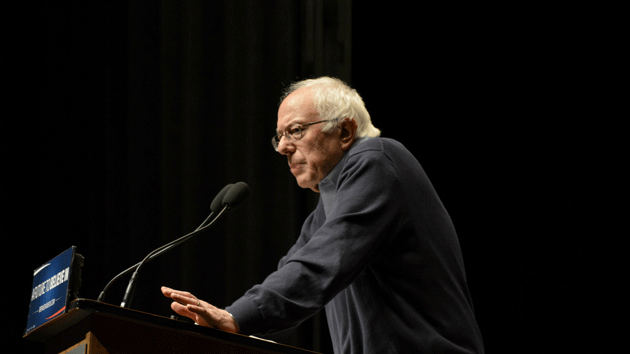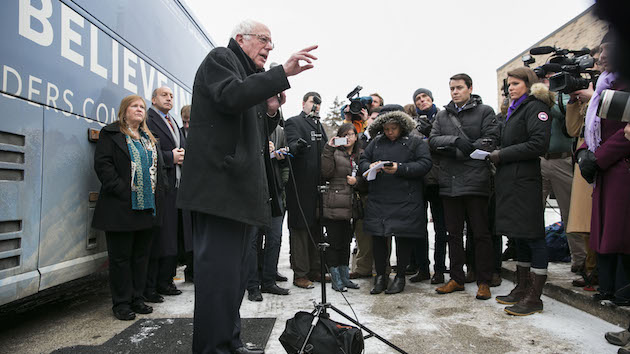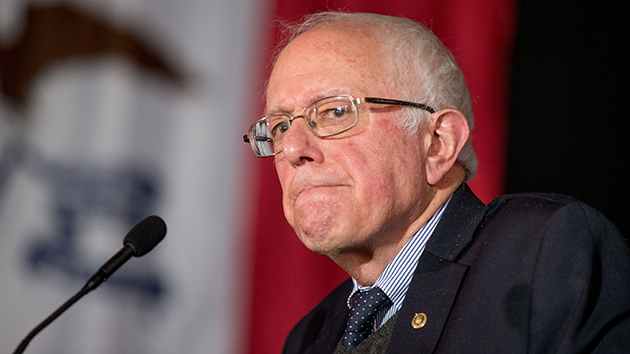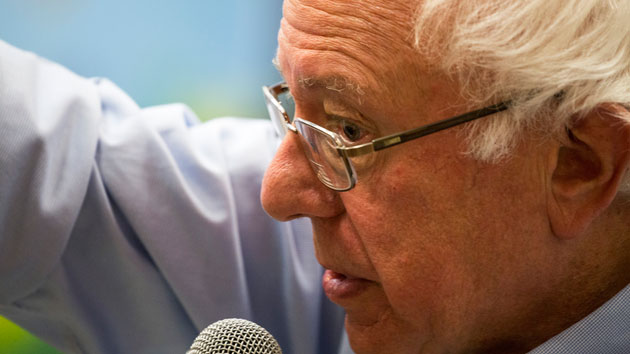
<a href="https://www.flickr.com/photos/ajhanson/24502962782/in/photolist-Dkf6ay-CxqNpK-Dkf6gf-CWjsHa-CxqNjz-D3GBrd-CxiXTu-DnxRrT-DuPfrT-DnxRbT-D3GAQo-Dsvjj1-CWjsQe-CxiXVd-D3GBhA-CxqNMi-D3GBDs-DnxRiX-CWjsq6-Dkf6L3-CWjsvB-CWjssa-Dkf62C-CxqNJn-DsvjLU-D3GBKu-Dkf63Q-CWjtfx-D3GAVd-Dkf69S-D3GBEE-DsvjYY-DuPfeP-vGQjz2-uKPWnL-uKPWCA-vVL7rY-vVL7to-vVL6u7-ySX8nC-ydwjSA-zbo9aa-D9vYE1-ySXozb-CD84u5-Dkf6hC-i8cUKn-CWjtcg-Dkf6Ns-vuWrL5">Alex Hanson</a>/Flickr
Editor’s note: Sen. Bernie Sanders jumped into the crowded 2020 race. This story was published during his first presidential bid. Click here for more Sanders stories from Mother Jones’ archives.
A few days before the 1986 Vermont gubernatorial election, Bernie Sanders held a rally in downtown Burlington. Sanders, then the independent mayor of the state’s largest city, was trailing badly in a three-way race with Democratic Gov. Madeleine Kunin, the state’s first female chief executive, and Republican Lt. Gov. Peter Smith, and he was running out of time.
So, as Kunin recounts in her 1994 memoir, Living a Political Life, Sanders leveled a tough attack against her. At that rally, Kunin wrote, Sanders declared that “he would be a better feminist than I.” According to her account, Sanders shouted that Kunin had “done nothing for women.” And, she recalled in her book, “When my husband, there as my surrogate (I was scheduled to speak elsewhere), rose to speak in my defense, he was booed by the crowd. Arthur’s red-faced anger became the children’s horror story of the campaign, which they embellished in the retelling—our private macabre joke.” Kunin was already coming under attack from the right for her vocal support of the Equal Rights Amendment; now she was being hammered for not being feminist enough.
Sanders, who was elected mayor of Burlington as an independent five years earlier, had entered the governor’s race with high hopes but struggled to gain traction. His fundraising was anemic, and members of the lefty coalition that formed his base in the state’s largest city had discouraged him from running, fearing that a vanity campaign might hurt other progressives further down the ticket. He also found himself battling against a historic candidate—a position he finds himself in once again, as he seeks to prevent Hillary Clinton from becoming the first woman to earn the presidential nomination of a major party.
“Liberals were angry I was running against a female Democrat,” Sanders recalled in his own memoir, Outsider in the House. Sanders, for his part, inflamed the tensions, arguing at the time that Kunin was an empty suit. “[M]any people are excited because she’s the first woman governor,” he told an interviewer in 1986. “But after that there ain’t much.” In another interview, he suggested the governor was coasting by on superficial approval. “I think [her] popularity is not very deep,” he said. “In other words, she does very well on television. She has an excellent press secretary.”
Days before the election, a group calling itself Women for Sanders took out an ad in the Burlington alt-weekly Vermont Vanguard asking voters whether they would choose “substance or image.” Sanders’ record, the ad said, “is one of commitment, support, and substantive accomplishment—not just rhetoric and symbolism.” The message was clear: Don’t vote for the woman just because she’s the woman.
Will You Vote for…Substance or Image? | Vanguard Press | Nov. 2, 1986
Kunin won reelection easily. Sanders finished a distant third. He then used the campaign as a springboard for a congressional campaign in 1988 but lost that race. He ran for Congress again two years later—and won. In 1996, when he faced Republican Susan Sweetser in a bid for reelection to the House, he again found himself up against a female candidate. This time, feminist writer Gloria Steinem traveled to Vermont to endorse Sanders, joking that she’d come to make the congressman “an honorary woman.” Another speaker, a female state senator, emphasized Sanders’ feminist credentials. “As we know, to be a feminist a person does not have to be a woman,” she said. “A feminist is a person who challenges the power structure of this country…Bernie Sanders is that kind of feminist.”
Kunin, who was later appointed ambassador to Switzerland by President Bill Clinton, endorsed Hillary Clinton during the 2008 presidential race, and this time around she is again backing Clinton. Noting that these days Sanders has a better haircut (which is to say, a haircut) and a nicer suit, she does have some kind words for him: “You usually say somebody’s caught up with the times—the times have caught up with Bernie.” She’s referring to his positions on income inequality.
But she sees a parallel between the ongoing Democratic primary and her own clash with Sanders. Namely, the idea that Sanders benefits from a subtle double standard. “He’ll grab an issue and because he’s so determined and passionate about it, it makes it seem like he cares more than Hillary,” Kunin says. “He can say things with a forcefulness that most women can’t. If a woman shouted all the time with her answers like Bernie does, she’d be booed off the stage. So women still have to behave well, where men don’t have to.”
Hillary Clinton has all but said as much. After Sanders suggested last fall that “all the shouting in the world” would not fix the problem of gun violence, some Clinton supporters suggested it was a sexist remark (especially in light of his own propensity for shouting). Clinton herself told a Des Moines audience that “sometimes when a woman speaks out, some people think it’s shouting.” More recently, the top two Democratic candidates clashed over Planned Parenthood, after the organization’s political-action wing endorsed Clinton in January. Sanders suggested it was only natural that the group would embrace the establishment candidate. The Clinton campaign responded by accusing Sanders of tarring a women’s health organization as the enemy.
The New York Times‘ entrance poll of Iowa caucus attendees revealed a gender divide, with Sanders winning male voters by eight points and Clinton winning female voters by nine. But the more telling divide was over age, not gender—Clinton won just 14 percent of voters under 30; Sanders just 26 percent of seniors. And Sanders’ support among the younger generation of women has left his long-ago rival puzzled. “[NPR] interviewed a young woman who said [Sanders] could do more for women than Hillary and that astounded me,” Kunin says. “I was really bothered by that, because I’ve been a feminist all my life and promoted issues like child care and the ERA and been fighting for that all my life like Hillary has. And for reasons that really baffle me he has attracted younger women—they like his energy and think he’ll get things done.”
In Kunin’s eyes, the same double standard she struggled against is alive. “I think people will say they’re not biased,” she observes, “and I think we’ve come a long way in that regard, but subconsciously—and this is true of women judging other women—we have certain expectations. You’d think people would be tired of his style but they’re not.”
















